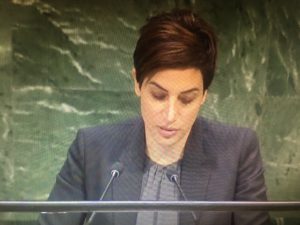 Open Debate on the role of reconciliation in maintaining international peace and security
Open Debate on the role of reconciliation in maintaining international peace and security
Security Council, United Nations
Mr. President,
While peace agreements may treat the symptoms of conflicts, their cause cannot be fully addressed without the restoration – at the grassroots level – of the fractured relationship that starts or fuels the conflict cycle. As the human pillar of conflict resolution, complementing its political and justice pillars, reconciliation is perhaps the only process that can help a post-conflict society come to terms with brutal and irreversible historical facts.
We would propose the following 3 elements as key for reconciliation to be credible as a project in the service of a peaceful future through on organic process of overcoming a violent past:
Firstly, reconciliation cannot be a substitute for justice or a disguise for impunity, both as a matter of principle and because the resentment created by the lack of accountability defeats the objective of viable peace. Rather, reconciliation should act as a complementary accountability mechanism that compels perpetrators to take responsibility for their actions.
Historically, individual and collective amnesties have been involved in political agreements in order to end a conflict. However, no amnesties granted by peace agreements or as part of reconciliation processes can extend to the commission of supreme international crimes like war crimes and crimes against humanity. The UN has both a moral and material responsibility to ensure this, particularly in respect of peace agreements concluded under its watch.
Secondly, however difficult it is for a society to tackle uncomfortable historical truths, identity questions, prejudices and inequalities, a reconciliation process, in order to be credible, must never be a vehicle for sanitizing or revising history.
Thirdly, as regards timing, it is hard to envisage a reconciliation process before reaching a political settlement, given the difficulty of the desired outcome, which is nothing less than social transformation through enabling the peaceful coexistence of rivals, leaving no room for different historical narrative or for questioning the truth, and creating unified social and political structures.
Lastly, Mr. president our biggest challenge when it comes to reconciliation is broadening its scope, from a national process, to one that can address grievances resulting from interstate conflict, without prejudice of course to the administration of international criminal justice.
Thank you.